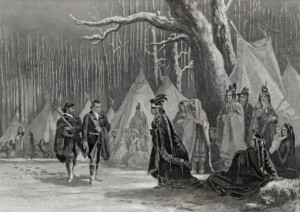In honor of Women’s History Month, and as a part of our Indigenous History series, we are highlighting a woman Indigenous leader of the Three Rivers region, Queen Aliquippa. Queen Aliquippa was a clan mother and acting chief of a band of Mingo Seneca, who settled at the confluence of the Monongahela and the Youghiogheny Rivers (now McKeesport), from the early 1730s until 1753. The traditional Iroquois system was matrilineal (based on the mother or female line) and the Iroquois split their tribes into clans (familial groups). Clan mothers were the leaders of each clan (a responsibility passed down through generations) and were held to the highest level of respect. They were responsible for choosing the chiefs of their tribe and for upholding chiefs to their position and duties.
In addition to being a clan mother, she was also considered the chief of her band of Mingo Seneca. It is not clear how exactly she became chief, but her people bypassed the usual process of naming a chief because they wanted to follow the leadership of Queen Aliquippa.
 She became known as “Queen” Aliquippa when the English bestowed the moniker of “Queen” in front of her name, but Queen Aliquippa was not a traditional monarch. However, British colonists were familiar with a Monarchical system and they recognized her as the leader of her people, therefore calling her “Queen.” Queen Aliquippa was a very strong leader, who carried an imperious attitude. She was well-respected by colonials and well-loved by her people. She remained a fiercely loyal ally to the British throughout the French and Indian conflict, and during this period, she did not engage in any military action while keeping a strict neutrality in war to keep her people safe. At the time, a young British military officer named George Washington was sent up the Monongahela River from Virginia in 1753 to deliver a message to the Indians and the French regarding land disputes in western Pennsylvania. As he neared the confluence of the Three Rivers, Washington stopped to sit down with a council of Indians, including Queen Aliquippa, who at this point was a very prominent voice for tribes not affiliated with the French. Later, after the French occupied the region around present-day Pittsburgh, Queen Aliquippa decided to move her band of Seneca east to an area that was unbothered and unsettled by the French for their own safety.
She became known as “Queen” Aliquippa when the English bestowed the moniker of “Queen” in front of her name, but Queen Aliquippa was not a traditional monarch. However, British colonists were familiar with a Monarchical system and they recognized her as the leader of her people, therefore calling her “Queen.” Queen Aliquippa was a very strong leader, who carried an imperious attitude. She was well-respected by colonials and well-loved by her people. She remained a fiercely loyal ally to the British throughout the French and Indian conflict, and during this period, she did not engage in any military action while keeping a strict neutrality in war to keep her people safe. At the time, a young British military officer named George Washington was sent up the Monongahela River from Virginia in 1753 to deliver a message to the Indians and the French regarding land disputes in western Pennsylvania. As he neared the confluence of the Three Rivers, Washington stopped to sit down with a council of Indians, including Queen Aliquippa, who at this point was a very prominent voice for tribes not affiliated with the French. Later, after the French occupied the region around present-day Pittsburgh, Queen Aliquippa decided to move her band of Seneca east to an area that was unbothered and unsettled by the French for their own safety.
 It should be noted that the area of Aliquippa, PA is not officially named after Queen Aliquippa, nor is it where this band of Seneca lived (they lived in present-day McKeesport). Rather, “Aliquippa” was arbitrarily chosen by the Pittsburgh and Lake Erie Railroad in 1878 as a name for a station along its route. The location of present-day Aliquippa is where the historic settlement of Logstown was in the 1700s.
Queen Aliquippa is a name to remember and celebrate. At a time when women’s rights were tightly restricted and kept from pursuing higher education, voting, or holding any leadership position, there were hundreds of Iroquoian clan mothers, just like Queen Aliquippa, who were transcending the limits that colonial men traditionally imposed upon the women in their colonies.
It should be noted that the area of Aliquippa, PA is not officially named after Queen Aliquippa, nor is it where this band of Seneca lived (they lived in present-day McKeesport). Rather, “Aliquippa” was arbitrarily chosen by the Pittsburgh and Lake Erie Railroad in 1878 as a name for a station along its route. The location of present-day Aliquippa is where the historic settlement of Logstown was in the 1700s.
Queen Aliquippa is a name to remember and celebrate. At a time when women’s rights were tightly restricted and kept from pursuing higher education, voting, or holding any leadership position, there were hundreds of Iroquoian clan mothers, just like Queen Aliquippa, who were transcending the limits that colonial men traditionally imposed upon the women in their colonies.

 She became known as “Queen” Aliquippa when the English bestowed the moniker of “Queen” in front of her name, but Queen Aliquippa was not a traditional monarch. However, British colonists were familiar with a Monarchical system and they recognized her as the leader of her people, therefore calling her “Queen.” Queen Aliquippa was a very strong leader, who carried an imperious attitude. She was well-respected by colonials and well-loved by her people. She remained a fiercely loyal ally to the British throughout the French and Indian conflict, and during this period, she did not engage in any military action while keeping a strict neutrality in war to keep her people safe. At the time, a young British military officer named George Washington was sent up the Monongahela River from Virginia in 1753 to deliver a message to the Indians and the French regarding land disputes in western Pennsylvania. As he neared the confluence of the Three Rivers, Washington stopped to sit down with a council of Indians, including Queen Aliquippa, who at this point was a very prominent voice for tribes not affiliated with the French. Later, after the French occupied the region around present-day Pittsburgh, Queen Aliquippa decided to move her band of Seneca east to an area that was unbothered and unsettled by the French for their own safety.
She became known as “Queen” Aliquippa when the English bestowed the moniker of “Queen” in front of her name, but Queen Aliquippa was not a traditional monarch. However, British colonists were familiar with a Monarchical system and they recognized her as the leader of her people, therefore calling her “Queen.” Queen Aliquippa was a very strong leader, who carried an imperious attitude. She was well-respected by colonials and well-loved by her people. She remained a fiercely loyal ally to the British throughout the French and Indian conflict, and during this period, she did not engage in any military action while keeping a strict neutrality in war to keep her people safe. At the time, a young British military officer named George Washington was sent up the Monongahela River from Virginia in 1753 to deliver a message to the Indians and the French regarding land disputes in western Pennsylvania. As he neared the confluence of the Three Rivers, Washington stopped to sit down with a council of Indians, including Queen Aliquippa, who at this point was a very prominent voice for tribes not affiliated with the French. Later, after the French occupied the region around present-day Pittsburgh, Queen Aliquippa decided to move her band of Seneca east to an area that was unbothered and unsettled by the French for their own safety.
 It should be noted that the area of Aliquippa, PA is not officially named after Queen Aliquippa, nor is it where this band of Seneca lived (they lived in present-day McKeesport). Rather, “Aliquippa” was arbitrarily chosen by the Pittsburgh and Lake Erie Railroad in 1878 as a name for a station along its route. The location of present-day Aliquippa is where the historic settlement of Logstown was in the 1700s.
Queen Aliquippa is a name to remember and celebrate. At a time when women’s rights were tightly restricted and kept from pursuing higher education, voting, or holding any leadership position, there were hundreds of Iroquoian clan mothers, just like Queen Aliquippa, who were transcending the limits that colonial men traditionally imposed upon the women in their colonies.
It should be noted that the area of Aliquippa, PA is not officially named after Queen Aliquippa, nor is it where this band of Seneca lived (they lived in present-day McKeesport). Rather, “Aliquippa” was arbitrarily chosen by the Pittsburgh and Lake Erie Railroad in 1878 as a name for a station along its route. The location of present-day Aliquippa is where the historic settlement of Logstown was in the 1700s.
Queen Aliquippa is a name to remember and celebrate. At a time when women’s rights were tightly restricted and kept from pursuing higher education, voting, or holding any leadership position, there were hundreds of Iroquoian clan mothers, just like Queen Aliquippa, who were transcending the limits that colonial men traditionally imposed upon the women in their colonies.

In collaboration with the Council of Three Rivers American Indian Center




